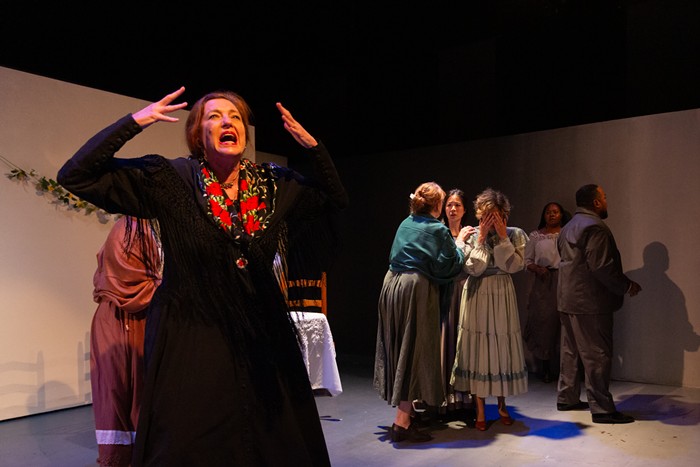It's not possible to perform Nassim the same way twice, but it's all too easy to spoil the show for those who haven't seen it. We're reminded of a challenge Artists Repertory Theatre laid down when they staged Red Rabbit White Rabbit, which is also by Iranian playwright Nassim Soleimanpour: "We dare you not to Google for more."
The surprise they were trying to keep is now common knowledge—or at least, it's in the brochure. The cast of Nassim changes with every showing. The script is always totally new to the performer onstage, and they read it for the first time as the production unfolds. This device began out of necessity, during a time when Soleimanpour couldn't leave Iran—he now lives in Berlin—but it has since become a main pillar of his work.
A co-production of Boom Arts and Portland Center Stage, Soleimanpour's tight, 75-minute Nassim has even more surprises for both its audience and its main stars. We don't recommend researching more about it, but we do have a few tips that would be fine to know.
• Who is performing? On the show's opening night, we were lucky enough to have New York actor and comedian Larry Owens perform, so our show was full of Owens' bright, comedic, queer energy, as he worked the crowd, cracked jokes based on the musical Wicked, and burst into Béyonce songs during technical difficulties.
By design, Nassim can function as a survey of an area's dramatic talent. Portland's run opened with Zia McCabe of the Dandy Warhols and even featured the Unipiper on Saturday.
We could tell the work will vary vastly depending on the performer. What would it be like from a dramatic powerhouse like Bobby Bermea (Wed April 24)? Or with the chaotic drag comedy of Kevin Cook AKA Poison Waters (Wed May 1)? Chris Williams, of Broke Gravy and Front Porch Sessions, will close out the run on Sunday, May 12, and we've seen his ability to play both wryly and with great sincerity. That'll be a good one. Here's a list of the show's performer schedule.
•Will you have to talk? No. There are a few audience recitation moments and even an opportunity to get up on stage, but the latter's quota is very small, so it will be filled by people who like that. For all its Fluxus, Nassim is still a work you can sit back and watch, but it's a little better if you do the recitation.
•Why is this play named Nassim? When considering a work, it's always important to step back and ask basic questions. Why should this piece be named for the playwright when his others aren't?
Nassim's two major themes, in our opinion, are language and introduction. The story of the play is both highly personal and deeply relatable, and that relatability makes the work easy to translate. Since its debut, Nassim has been translated and performed in Sweden, Mexico, China, Japan, and South Korea, among many others. The work carries a simple story from Soleimanpour's life, and it introduces him to the performer and the audience. It also introduces whomever is performing it, as they imbue the show with their own talent and personality.
Like we said, we don't recommend knowing much about Nassim, if you haven't read the other reviews—don't. At least, wait until after you've seen the show. Of the local reviews we've seen, one gave away seemingly every plot point, and the other ruined a pretty important surprise.
Going into detail about how the show unfolds takes away a lot of the magic, like when we caught our seatmate checking his watch, trying to time what was happening on stage. That's a legitimate goosebump, a moment of curiosity. That's the thing Nassim creates, in both its performers and in its audience: It's wonder, and it's delicate.
Portland Center Stage and Boom Arts co-present Nassim at the Ellyn Bye Studio, 128 NW 11th Portland, through May 12, tickets here, $25-66.50, all ages




















